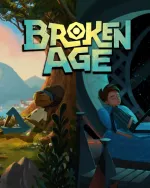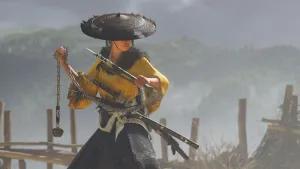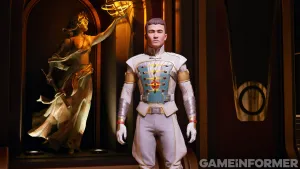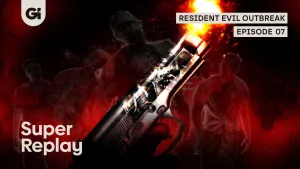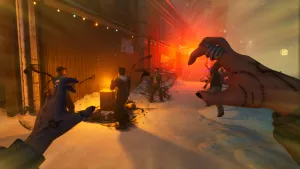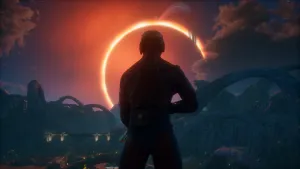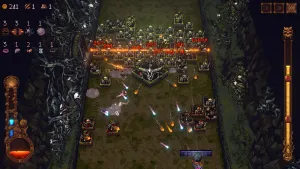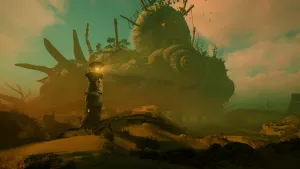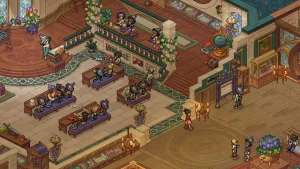Broken Age

Last month I had the opportunity to visit Double Fine’s San Francisco studio for some hands-on time with its upcoming Kickstarter-funded adventure game, Broken Age. During my visit (read our in-depth preview here), I chatted with producer Greg Rice and point-and-click adventure legend Tim Schafer about the highly publicized upcoming downloadable title. We touched on the inspiration for the game, cherry picking the best elements of adventure games, and what the pros and cons of working publisher-free.
Where did the idea for Broken Age come from?
Schafer: I had these concepts I’ve been interested in for a while. I wanted to do a story about a girl that fights her way out of her own sacrifice. And I wanted to do a story about someone alone on a spaceship. I’ve always been interested in that setting. I didn’t know that was going to be the setting of the game when we started the Kickstarter, but when I was brainstorming I was purposefully thinking through older ideas to see what I was still interested in now. Back when I made Grim Fandango, I was really into film noir, and I think the thing that you make has to come out of something you’re really passionate about at that moment.
Have you taken anything from the reception of The Cave, another Double Fine adventure title, and applied it to this?
Schafer: Yeah, it’s interesting because people really liked the art and humor of that game, and I would say the number one thing they complained about was the backtracking. That scared me when people complained about that, because I’m like “have you played an adventure game lately?” There’s a lot of backtracking in adventure games. That just feeds into my general anxiety of how people will react to an adventure game now. They have these fond memories of playing them when they were 12. How much are they just missing being 12, and how much are they missing actually pointing and clicking and being stuck on a puzzle and not knowing what to do? There’s always backtracking in adventure games, but ever since Full Throttle we’ve done that thing where you can double click on a door to get across a room really fast. If you make it so that you can get across the world really fast after you find out what to do with that golden egg and you get there quick, that’s when I think it’s okay to backtrack.
Rice: I think The Cave ran into a problem because it looks, on the surface, like a platformer. People expect that they should be getting through levels and progressing that way. With [Broken Age] it’s a beautiful world that you can absorb, explore, and get lost in. We’re not thinking about it as backtracking as much as exploring a world.
Schafer: People that don’t play a lot of adventure games, you watch them during our Hour of Fun company focus test, and like some of the RTS players were triple-clicking on every door. They’d just be hyper-clicking everywhere. Then they were just skipping the dialogue, and I’m like, “Wow, that’s how some people are going to play this game.” But we build it for those people who just want to get immersed and take their time. But you also have to make it robust enough to still work if people are flying through it. Not slow them down against their will, but make them want to slow down.
What other elements from legacy adventure games have you realized haven’t aged well?
Schafer: There was always that question when we first started, “Should we have puzzles?” Some games are more narrative-driven and about the experience, like a flow of just moving through an experience. Puzzles can kind of block that flow. Maybe it’s just because I like making puzzles and solving them in old adventure games – I feel like that is the brick that those games are made out of. The unit of entertainment that adventure games are made out of. I was also taking the leap knowing our [Kickstarter] backers wanted puzzles. I think it’s just a matter of making well-crafted puzzles. Puzzles have this essential element of making it for you to be confused for a while; they make it fun to be stuck by encouraging you. Like, “You should be able to solve this! It’s right here! You got it!” What we always do with adventure games is we try to streamline the interface. We used to have words on the bottom of the screen, then we replaced them with icons, then Full Throttle was full-screen, and you’d pick your verbs with this kind of verb-wheel. Then with Grim Fandango you could pick up and examine an object. But more and more with modern adventure games like Machinarium, there’s a general interact-with-object command. In Maniac Mansion you’d be like, “should I fix the phone, or should I open the phone, or should I push the phone?” With that kind of decision making you really incorporate all that choice in a context-sensitive interact-with-object.
Does streamlining the user interface reduce the number of “aha” moments?
Schafer: No, we were always moving in that direction, even before this game. Like Maniac Mansion had even more verbs than The Secret of Monkey Island. We took out a row of them. There’s no Fix or Turn on/Turn off. Partially because you’re in pirate days so there’s nothing to turn on or turn off. Then by Day of the Tentacle I think it was down to nine [verbs], and then I think in Full Throttle it just had four verbs. Then Grim Fandango had two or three, and Psychonauts had one verb. That was always a discussion, even back in 1989 back at the [Skywalker] Ranch. We were having this discussion even then – they’re all basically “Use.” We had this Use verb and all the others are basically Use. Because if you go up to a telephone and say Pick Up or Pull, you basically mean to Use the phone. So we were kind of pretending we needed all these different verbs just to make it interesting for the player, but it’s not that interesting because you really just want to Use everything. All it really means is that it’s kind of fun that you can come up with a joke for the guy that says, “Pick up the couch” and he makes up a joke about how heavy the couch is. But it’s also a pain to have to go and write a line for every single weird verb. Like, “Fix couch.” “It’s not broken!”
Rice: That comes from text adventures, too, right? Where the entire game was trying to guess the word to use the thing.
Schafer: I think it streamlines it so player intention is clearer. If you do the context-sensitive stuff with the right amount of cues then you can tell what the player is intending to do.
Rice: It’s interesting to watch people who don’t play games much, too. I played Full Throttle with my mom and that’s the thing she got hung up on. She couldn’t wrap her head around verbs. Here it’s like, “Of course, this is the thing I want to do.”
Schafer: In some ways your inventory becomes your verbs. Like each inventory item is a verb. Like “Use knife on…”
What’s the most exciting for you about developing Broken Age?
Schafer: Every new asset that’s created. It’s fun to watch the team and creative people from different disciplines working together to make a collaborative work of art. Not just the visual artists. Sure, they’ll paint an incredible painting and then the animators will do some hilarious scene, but the musicians and the sound people will create and audio experience that’s incredible. Like an incredible sound effect. Or someone gets a new tool working. Or a gameplay sequence goes up that works really well. Everyone can interject their own ideas into it. It’s fun watching that all come together. Like having something in the end that makes you laugh, looks beautiful, or just sounds good. It’s not like it’s one person that’s sitting down and spitting that all out. Although I could, but I choose not to.
Rice: It always ends up better than I expect. I’ll hear an idea from Tim and it sound cool, then I’ll see Bagel’s painting of that and I’ll be like, “Holy s--- that looks amazing.” Then our animator will get ahold of it and I’ll be like, “I didn’t even know our characters could do that.” It just keeps getting better and better because all these amazing artists are touching it and pushing it in the right direction.
Not having a publisher has opened up a lot of the possibilities, but publishers are also responsible for keeping developers accountable for deadlines and budgeting. Having run out of Kickstarter money, are you still finding that the pros of being publisher-free outweigh the cons?
Schafer: You just have to impose some of the good parts of [having a publisher] on yourself. That process is where you have milestones and the team evaluating it. It’s still better to have people here who know the team and know the goals of the game being the ones who do the evaluation. When you’re working with a good partner it’s great, but even if you’re working with a great partner you still spend a lot of time bringing them up to speed. That’s a tax on your time and the team’s time. They’ll be like, “I don’t really understand where you’re going here, could someone write me a big, full design document?” Then you have to take the lead designer off the game for a week to write a game-design document that maybe they were using a wiki or Scrum [software development software] so they didn’t have to do that before. Then [a publisher] could say, “We’d really like a technical design document,” so then your programmer spends a week writing that. You get a lot of those [checks] for free when you’re working with a small team and everyone knows what’s going on, but when you have a removed partner you have to explain everything to them. It’s a tax on your time which takes away from time that could be spent making the game better. But you still have to ask yourself those questions. You still have to make sure the person who would’ve written the technical-design document could’ve written the document and has all these plans. You still have to go through the process of a rigorous schedule. Then you need some sort of external force that looks through the game and says if it’s good enough. The team may say it’s good enough, but it’s good to have outside people play and be like, “I didn’t have any idea what to do here.”
Rice: It’s been nice because it lets us course correct, too. Usually, if you’re on a strict milestone schedule with a publisher you know months ahead what has to be delivered at that milestone. Maybe things change and maybe you should actually be doing something different at that time. We can make that decision on the fly based on what we think is best for the game.
Do you feel like this game has already been sold to its audience via the Kickstarter? What sort of projections do you have for the farther reach of the game?
Schafer: I feel two different ways about it. One way, it’s already been a success. The moment we launched that Kickstarter and it started taking off, it was already a success and everything else was gravy in a way, because it had already paid for itself. We’re so used to scrounging for money to make our games and feeling so lucky that we got to make a game, and if we make money, it’s extra. So this game has already paid for itself. Then there’s this other part of me where there’s this other opportunity to reach people that we couldn’t reach before. When we made video games in the ‘90s, not everyone was on a computer. Now everybody is on a computer or a tablet or a mobile device. So there’s a whole bunch of new people out there who would like adventure games, or games that are about story and characters that would react to that kind of art. People that don’t necessarily think they don’t like games in general, that think they’re violent or a waste of time. Those people might like this kind of story, setting, art, or world. There is part of me that’s excited to reach those people on mobile devices. But I don’t want to indulge that too much, because I feel like I feel grateful and happy for the fact that we just broke even.
Any key messages you want to communicate to readers about the game that you haven’t yet?
Schafer: It’s f---ing awesome. I haven’t really pitched it to the public yet. I’m so used to everyone seeing everything in the documentary and now I really have to sum this up. How do I pitch this game? We’re making something very different and special. To me, it’s about a story topic we’ve never really gotten into. A theme that’s more emotional. I mean, you are fighting a giant monster and you are in a spaceship so there’s some genre excitement there, but it’s also about what these kids are going through as they’re coming of age. This works better when you’re pitching an indie movie about coming of age stories. Like being at Sundance [Film Festival] with a coming-of-age story. You can’t really go to E3 with that. “Hey E3! Come over here and see our coming-of-age story!”

Get the Game Informer Print Edition!
Explore your favorite games in premium print format, delivered to your door.
- 10 issues per year
- Only $4.80 per issue
- Full digital magazine archive access
- Since 1991
